|
|
| |
|
 We do news right, not fast
We do news right, not fast
Note: This blog expresses only the opinions of the blog owner,
and does not represent the opinion of any organization or blog
that is associated with The Golden Rock.
|
|
Archive for the ‘China’ Category
Monday, July 11th, 2011
- Before getting into the focus story today, Sina News just posted a story about WU XIA’s box office in China:
According to the story, the film only made RMB 92 million in the seven days, which co-investor Stellar Megamedia’s CEO admits to being disappointed by. However, he also points out that the film already took up 50% of total box office gross in China this past week, which means that people just aren’t going to movies. He also believes that the recent box office gouging scandal has only minimal impact (more on that later), and that there are bigger factors at play here.
We Pictures marketing head Mr. Lu also admits to being disappointed with the gross, especially its weekend gross. He says total box office in July so far is “outrageously low” compared to the same time last year. However, Lu also says that with overseas sale, the film will eventually find its way to profitability. More analysis of WU XIA’s box office when figures come out in a day or two.
- Today’s focus story is on internet distribution for films in China. In January 2011, LET THE BULLETS FLY premiered on Chinese video sites such as Youku, Tudou, and others, on an on-demand basis. Essentially, the idea is that you pay RMB 5, and you can watch the film as many times as you’d like within 48 hours. The film was viewed over 200,000 times in 20 days, grossing over RMB 1 million.
With legitimate DVD cost continuing to rise and piracy still rampant, this is the new way of film distribution in China. Basically, a film typically lands on these video sites about a month after their theatrical release. After a paid VIP Zone window, which allows members to watch the film in HD for a small premium, the film becomes free for all members. As of today, A BEAUTIFUL LIFE, NO. 32 B DISTRICT, and LOVE FOR LIFE can all be seen for free already, some with subtitles and some without. These sites also include a large arsenal of television dramas, including all 30 episodes of NAKED WEDDING (trust me, they’re not naked like the way you think they are), which just premiered on one major Chinese regional network tonight.
Only a year or so ago, films were being uploaded illegally by users mainly on sites like Tudou and Youku. These sites pulled off a major cleanup and began acquiring licenses from content owners, which would make sense considering the amount of advertising these deals can generate. LeTV (the site I frequent the most) is one of the leading video sites in China. Not only has it built up an archive of over 4,000 films, it is also the first company of its kind to be traded on the stock market. In addition to a free iPad app, LeTV also sells an Apple TV-like device that streams its archive of films via the internet to television in HD, and they’re planning to sell 100,000 of these things this year. I saw an ad for it when I was in the cinema this past weekend:

Tudou, Youku, and now even CCTV’s movie channel have made mobile apps for easier access to their films.
This is a very similar model to what Apple is doing in the states and Japan with iTunes, opening up more platforms and choices for audiences to watch films legitimately. However, these Chinese film industry is relying on this platform to work more so than the studios in the United States. Due to high ticket prices, cinema going is still considered a luxury for workers who only make about an average of US$500 a month. By making films available at a lower price than pirated DVDs, content owners are taking back any revenue they can in any possible way. As I had predicted earlier, the Chinese film industry is definitely heading towards a bubble situation, but there are things being done to delay that day, and internet distribution is one of them.
However, there are problems that come with this model:
1) There’s no report on the true impact of these technology has on cinema revenue yet, but once there is, cinema owners will not be happy (the previous report about July box office being low may be one of the first signs). Like it or not, cinema revenue is still the best way for films to make money, and on a personal note, I believe that films are made to be seen in cinema. If the cinemas go down, the industry will also be severely impacted in a negative way. The same goes for legitimate video sales. Video publisher already had to resort to releasing inferior DVD-5 versions of Chinese films to make them more affordable, but internet distribution is offering these films at a better video quality for a lower price. With Blu-rays being sold at astronomical prices and DVD sales likely to go way down, the Chinese video market may eventually disappear. As far as I know, there is no legit video rental industry in China at the moment.
2) Rising licensing cost. While smaller films will appreciate that video sites will buy their content, production companies are likely charging more and more for bigger films. One day, these licenses may become so expensive that video sites don’t see the point in shelling out the money for them anymore. The rising cost situation is already happening on the TV drama end, where prices are per episode, not per series.
3) Copyright infringement. LeTV recently filed suit against a manufacturer of a home media center (similar to LeTV’s television box) for allegedly providing access to films that LeTV claims to hold exclusive rights for. The media scene in China is very fragmented right now, with more video sites, television stations, and news outlets than I care to count, which means many different companies sharing content that they might not be permitted of having. This may discourage video sites to pay the big bucks for exclusive rights, or encourage video sites to clamp down harder on enforcing their exclusive rights, as well as extending pay windows. This will have a negative effect on consumers, who may just go back to illegal downloads or buying pirated DVDs.
There are a million directions which internet film distribution in China can go, but I say the more legit ways people have to watch films, the healthier the film industry will be. Sure, a film should be watched in the cinema, but it seems like for now, the masses have spoken, and they say otherwise.
- Following up on the box office gouging story from last week, netizens are still reporting that they’re not getting tickets to films they paid to see. To refresh your memory, audience buys ticket to WU XIA, theater prints a ticket to BEGINNING OF GREAT REVIVAL. Audience watches WU XIA, but money go towards BEGINNING OF GREAT REVIVAL.
Netizens reported last week that this practice is still happening in some cities. The distributor lamented that cinemas are simply saying that their employees made mistakes at the box office and that they can do little more than that. China Film Group continues to deny and decry the practice, while Stellar Media continues its campaign of offering RMB 1000 to each report of box office gouging for WU XIA. Stellar Media says they have already given out RMB 5000, and they have no idea how many more thousands they’ll have to give out.
Weibo reports of gouging have slowed down over the weekend, and I will say that this past weekend, I was given printed tickets for films that I actually bought tickets for, so no RMB 1000 for me.
- TVB/Shaw Brothers’ FORTUNE BUDDIES, spun off from the TVB variety show FUN WITH LIZA AND GODS, completed its 20-day shoot. Star/producer Eric Tsang said the film will only have three days of post-production because it has to go through Mainland censorship before its opening date of August 11th (simultaneous with Hong Kong). This is not the shortest shoot for a Hong Kong film - Johnnie To/Wai Ka Fai’s HELP!! only took 30 days from shooting to hitting cinemas, and director Pang Ho-Cheung shot EXODUS in reportedly 18 days. Go, Hong Kong cinema!
Trailer for FORTUNE BUDDIES here.
And now, today’s edition of WHAT I LEARNED FROM SINA WEIBO:
- Derek “son of Eric” Tsang posted the cover of the script for Pang Ho-Cheung’s reportedly Beijing-set sequel to LOVE IN A PUFF. It revealed two things: the script is co-written by Pang and Hong Kong novelist Lu Yi Xin, and its current English title is LOVE IN A BUFF. No kidding. Tsang wrote that he was heading back to Hong Kong to do a cameo for the film, but the weibo post has since been deleted.
- William Chan (HI, FIDELITY) has signed on for a 3D film called WU XING GONG LUE, a drama about Mongolian wrestlers in the 1960s directed by Casey Chan. According to its Baidu entry, the film is supposed to star Siqin Gaowa, Betty Sun, and Josie Ho, and it was presented at Hong Kong’s Filmart in 2010.
- Donnie Yen says that he personally prefers the Cantonese version of WU XIA, though it may have something to do with the fact that he spoke Cantonese in the film (He was dubbed in the Mandarin version).
- MURDERER director Roy Chow will soon shoot a film starring a buffed up Nick Cheung and (after some research) Simon Yam. Could this be the MURDERER 2 that Simon Yam was referring to? According to this story, Janice Man will also co-star.
Next time, Chinese box office analysis, a busy, low-budget summer in Hong Kong and whatever else we can get our hands on.
Posted in DVD, actors, feature, TV, China, Hong Kong, news, trailers, box office | No Comments »
Friday, July 8th, 2011
- This is an issue that’s been discussed since last year, but it’s still worth throwing it out because it’s an ongoing problem with no solution in sight.
Recently, a photo of an alleged list of actors’ pay on PAINTED SKIN 2 was posted on Sina Weibo by a netizen. The list showed that the highest-paid actor of the film is being paid only RMB4 million to be in the film, and award-winning actress Kara Hui is being paid only RMB 300,000 for her role. Hui immediately denied the list on Weibo, because, well…she’s not even in the film. However, one of the producers weibo-ed that the list is about right.
Whether the list is true or not, this is a good time to bring up what’s happening in China right now regarding actors’ pay and how it affects Hong Kong cinema. According to a report in Apple Daily last year, Chow Yun Fat is currently the top earner in Chinese cinema now, making RMB 40 million per film. Andy Lau and Donnie Yen are not far behind, with roughly RMB 25 million each. However, Mainland actors continue to get the shaft, with even names like Ge You, Aloys Chen, and Zhou Xun getting less than RMB 5 million for each film.
How does this affect Hong Kong cinema, you ask? With Hong Kong stars getting these outrageous pay, it’s now hard for Hong Kong producers to be able to afford films with bankable star. This may explain the attempt to nurture films with mainly young talent (not that it’s working. Is there even a new Andy Lau out there?), and this is the most likely reason that Chow Yun Fat hasn’t been in a Cantonese film in 16 years. Salary issues was rumored to be the reason he dropped out of John Woo’s RED CLIFF.
Meanwhile, the Chinese film industry is also realizing that revenue isn’t growing quick enough to cover costs. While Chinese blockbusters are making big bucks, they’re not making enough to cover ballooning budgets, especially if talents are taking up 1/3 of each films budget. THE LOST BLADESMAN made RMB160 million at the Chinese box office, which is no small feat. However, its budget was a reported RMB 80 million, which means it would need to have made at least RMB 200 million at the box office just to break even.
If the film industry shifts to a point where China can finally produce its own box office-guaranteed stars, producers will either get wise and use strictly China stars (bad for HK stars), or they will have to spend even more on talent (bad for everyone except the stars). Chinese cinema can only grow bigger with bigger productions, but it’s getting to a point where domestic gross is not enough to cover the budget any more. Foreign sales are also drying up, as foreign audiences are getting tired of big Chinese period flicks.
Will Chow Yun Fat, Donnie, and Andy Lau keep sucking up their 20-40 million per film, or will they soon have to compromise? Unless the Chinese film industry start controlling the number of productions, their inflating budgets, and the enormous amount of money they pay to Hong Kong talents, Chinese cinema is undoubtedly heading towards a bubble. And when that bubble pops, everyone’s going down.
- Hong Kong MPA released the box office figures for the first half of 2011. As we all know already, SEX AND ZEN: EXTREME ECSTASY, fueled by curiosity by both Hong Kongers and visiting Mainland Chinese tourists, managed to beat the general negative word-of-mouth (bonus: popular video of Chapman To reading a scathing netizen review - translation could be better, though) and became the highest-grossing Hong Kong film in years (which is amusing for a society that’s been progressing backwards in terms of morals). According to the report, 24 Hong Kong films were released, which would be about on pace with the past few years.
SEX AND ZEN was essentially the AVATAR-like outlier, with local films in general grossing lower than last year’s films. With the rest of the year looking fairly devoid of big box office performers (it’s WU XIA in August, then OVERHEARD 2, then not much until December), expect SEX AND ZEN to keep its top spot for the rest of the year.
- While we’re at it, Film Business Asia looked at Korean box office in the first half of the year. After its bubble popped a few years ago, it seems like the South Korean film industry is stabilizing, as admissions in the first six months of 2011 is only down 2.1% (remember last year cinemas had AVATAR). Better yet, Korean films are currently taking a higher market share in the first half year than the same period last year, as three of the five top-grossing films are Korean.
- Before you say say REST ON YOUR SHOULDER, another feud has brewed up in Chinese cinema. A few days ago, I tweeted a link to the peculiar poster for director Jiang Cheng’s TO LOVE OR NOT. The poster showed stars Alex Fong Chung-Sun and Li Shaoran making out passionately in a bathtub, and that has sparked a lot of feedback about what the film will be like.

And then Li Shaoran fought back.
The star apparently now denies that she ever did the scene depicted in the poster. She insists that the “woman” spitting water is a male double wearing a wig, and then her part in the scene was only one shot that did not involve kissing. She is now refusing to do any further promotional activities for the film.
Director Jiang Cheng then fought back, saying that only one shot in the sequence (the one of the two falling into the tub) was done by body doubles, and that everything else was done by the actors. Of course, now the feud is turning into a he said, she said, with Li spilling everything she was dissatisfied about Jiang, and Jiang Li of essentially being a difficult actress to work with. Both sides have even used Alex Fong as their weapon against the other. Meanwhile, sources confirm that the stills are taken directly from the final cut rather than stills taken on set.
On the surface, this is close to gossip, but if we peel that back, we can speculate what is going on here. 1) There’s a real feud between Li and Jiang, with one actress embarrassed for being talked into doing a scene she now regrets doing. 2) It’s a week away from the film’s release. You don’t have real bankable stars. Any news is good news. 3) Something else. I won’t taking any of these three positions, but the Chinese film industry isn’t exactly the most transparent one, and it’s likely impossible to ever really know what is going on here.
Anyway, if you can read Chinese, read all about it here.
- Upcoming Chinese animated film LEGEND OF A RABBIT has the netizens talking, but in a bad way. Apparently, the character designs all look a little too close to KUNG FU PANDA for comfort. Director Sun Lijun is strongly denying that his work is being influenced by KUNG FU PANDA in any way.
Some of his defenses:
“Netizens say that LEGEND OF A RABBIT is the copycat version of KUNG FU PANDA, then why doesn’t Dreamworks sue us over copyright?! LEGEND OF A RABBIT has been sold to 62 countries. Overseas buyers are not stupid. You think they haven’t seen KUNG FU PANDA?!”
“The characters in LEGEND OF A RABBIT are very different from KUNG FU PANDA’s. Why don’t they say that KUNG FU PANDA took influences from Chinese kung fu?”
[when asked why has hasn’t seen KUNG FU PANDA 2] “Not interested. No second film is better than the first film”
Obviously, Sun hasn’t seen THE GODFATHER PART II.
See the trailer for LEGEND OF A RABBIT here and decide for yourself.
- After AFTERSHOCK and BEGINNING OF THE GREAT REVIVAL, it’s now time for Korea to have their first film converted into the digital IMAX format. Korea still has something to be proud of, though – it’ll be the first non-English-language film to be converted into IMAX 3D. Korea currently has ten IMAX screens that can show the film, and CJ Entertainment operates all ten of them. It’s a no-brainer.
Check out the teaser for the monster film here.
Next time: Spike some Beach. A double feature across the border. And whatever else comes my way.
Posted in actors, gossip, animation, China, trailers, Hong Kong, South Korea, box office | No Comments »
Wednesday, July 6th, 2011
No, this entry is not going to be purely on the communist propaganda flick. The title actually refers to the revival of this blog. The Golden Rock has been away for a while due to various issues (mainly time-related) and the shift to Twitter. For that I can only offer an apology to Boss Kozo and people who read on a regular basis, and I hope that this revival will last more than a few entries.
With that, the blog will not be updated on a daily basis. I will be tightening the focus back to Hong Kong and China, since there’s already plenty of news to cover in these two regions. Rather than line-by-line links, the blog entries will be more focused on analysis of each story. You will see that new format below.
As always, there will be no gossip, because whether Lucas Tse is changing his last name is none of my concern, and it probably isn’t yours, either (unless you’re a member of the family or Lucas’ school). On the other hand, if Cecilia Cheung causes production on THE LION ROARS 2 to stop because of her divorce, then it’ll be covered here.
For broader coverage of Asian cinema, please visit Film Business Asia. They are where I go to most for English-language Asian cinema coverage, and I recommend all to do the same.
So here we go:
- First story today is on Jacob Cheung’s REST ON YOUR SHOULDER. The Chinese media has been covering this film intensely ever since its premiere at the Shanghai Film Festival (it played in competition). It’s hard to dig through all the rumors and speculation, but here are what appear to have happened:
Cheung’s investors have spent RMB 60-70 million (a fairly high budget for its genre) on a special effects-filled fantasy starring Aloys Chen, Guey Lun Mei, and Gigi Leung. However, Cheung’s absence at the festival screening has sparked rumors that Cheung is perhaps not happy with how the film is being presented. Also, the distributor took many steps, including heavy security and playing it at a small auditorium, to make sure the film is not shown to a large audience, which also points to possible nervousness on the part of the distributors that the film isn’t very good.
At the festival, the head of the production company stated to the press that the theatrical version of the film will be cut to 90 minutes (from 120), which further fueled the “Cheung not happy” rumors. Two weeks ago, the production company gave in and said that the full 120-minute cut will be the theatrical version (especially ironic, given Derek Elley’s review).
Just when things seem to be settling, Cheung wrote on his Sina Weibo this past weekend that he has been waiting in Beijing to be contacted about promotion for the film, but no one has asked him to do so. It’s even messier because the production company has canceled promotional events with “talent unavailability” as an excuse (after Chen and Guey publicly stated they are fully behind the film). Now the talk is that the production company are simply giving up for some reason. Meanwhile, Cheung has taken to Weibo to promote the film on his own, with Charlie Yeung and other celebrities passing the word. The distributor has been contacted, and they said they are shocked by Cheung’s weibo entry. They also pointed out that the stars are all currently tied up on other projects (Aloys on PAINTED SKIN 2, Jian Yi Yan is doing a play, and the others as well).
Opening just four days after Peter Chan’s WU XIA, what will happen to REST ON YOUR SHOULDER this weekend? I’ll be watching the film this weekend on opening day in Shenzhen, and we’ll know whether Cheung’s efforts worked next week when the box office numbers are out.
Story is mostly from this article (and other articles) at mtime
- Speaking of WU XIA, the film opened on July 4th in China. However, a controversy has already brewed up before the day ended, as netizens uploaded pictures of their handwritten tickets from China’s Jinyi Cinemas chain on Weibo. Those posts were deleted several hours later.
Here’s how it works: You walk up to the box office, and you buy a ticket to WU XIA. However, the theater hands you a ticket to BEGINNING OF THE GREAT REVIVAL instead and writes down your WU XIA showing information by hand. Yes, you can still watch WU XIA with your ticket, but the computer marks down that your money went to BEGINNING OF THE GREAT REVIVAL. This happened reportedly in several cities.
Damage control was quickly initiated, with the cinema chain’s spokesperson explaining that the ticket buyers changed their mind, and their staff hadn’t followed proper procedure by printing new tickets and canceling the other ones. China Film Group denies that they have any hand in it, and WU XIA’s distributors have also said that they’ve spoken to the cinema chain and that the matter is “settled”. WU XIA’s distributor is also now offering a RMB 1,000 reward for any reports of such box office gouging, so if you get a handwritten ticket for WU XIA in China, be sure to send it in to Stellar.
This is not the first time “box office gouging” has happened. Back in December, netizens discovered that people were buying tickets to MY NAME IS NOBODY and ended up getting a printed ticket to SACRIFICE. Netizens are wising up to the practice, and it’s likely this will only be a temporary fad.
- And now, China box office:
As expected, BEGINNING OF THE GREAT REVIVAL led the box office chart again, but the weeklong gross was not as high as I had predicted, given that the party would want to score on the big CCP anniversary. Between June 27th and July 3rd, BEGINNING OF THE GREAT REVIVAL made RMB 92.15 million for a 19-day total of RMB 317.15 million. This is not close to the final gross of FOUNDING OF A REPUBLIC, and nowhere near the 30 million admissions / RMB 800 million gross that China Film Group is targeting.
So, what happened? The film had a significantly reduced number of showings this week (from 88,000 shows to 64,000), and the film faced competition from new entries TREASURE INN (which made an impressive RMB 54.5 million), THE DEVIL INSIDE ME (RMB 8.15 million), and the dubbed French flick COURSIER (RMB 8.1 million), as well as stayovers THE PRETENDING LOVERS (RMB 28.1 million after 10 days), SNOW FLOWER AND SECRET FAN (RMB32.75 million after 10 days), and ANIMALS UNITED (RMB39.95 million after 10 days). KUNG FU PANDA has also now passed the RMB600 million mark.
I had two reactions to this news (in order): Why didn’t the party/China Film Group do something to rig the numbers, and why am I surprised that China Film Group ISN’T rigging the numbers (especially with 80 million communist party members in China alone)? We were so bombarded in foreign media about how hard the party is pushing this film that we’re surprised when they follow the rules, and now the film seems to be performing beneath expectations. Shouldn’t we be ashamed of the assumptions and distrust we’re putting into this system, especially when they’re (appearing to be) proving us wrong?
China Film Group’s response to the current box office performance of BEGINNING OF GREAT REVIVAL? “When there’s a big film, shows will be cut accordingly. Everything will operate as the market dictates.” They have also said they’re ready for the release of TRANSFORMERS 3 on July 21st.
By the way, no one has confirmed there’s a cap that stops all foreign films from being released until REVIVAL hits 800 million. If China Film Group is going ahead with the July 21st release for TRANSFORMERS, then the quote in this New York Times story is wrong. Want to know why I kind of believe CFG? Because they’re distributing TRANSFORMERS, too.
- Short bits of production news:
- Daniel Lee has officially wrapped the shoot for WHITE VENGEANCE, starring Leon Lai, Zhang Hanyu, Anthony Wong, and Jordan Chan. The film will reportedly now aim for a late November release. This now locks down the films coming in the year-end slot: WHITE VENGEANCE, Derek Yee’s THE GREAT MAGICIAN, Zhang Yimou’s HEROES OF NANJING, Tsui Hark’s FLYING SWORDS OF DRAGON GATE, and (supposedly) Wong Kar Wai’s GRANDMASTER. Sure they don’t want to shuffle that a little bit?
- Zhou Dongyu, Richie Ren, Gigi Leung, Aarif Lee, and Teddy Robin will be starring in QIN CHENG ZHI LIAN (no English title yet), a tearjerker directed by Barbara Wong. The film began shooting on July 21st, and it’s aiming to open at the end of December. I’m afraid. Very afraid.
Next time: “How much did they pay them”?! / Stephen Fung starts on Tai Chi / SEX AND ZEN boosts Hong Kong box office in first half of 2011.
Posted in gossip, China, review, box office | No Comments »
Friday, April 22nd, 2011
There have been a couple of outspoken interviews recently - one from a Hong Kong filmmaker, and one about Hong Kong films. Over these two posts, I present translations of these two opinions as a taste of what I’m picking up day-to-day reading Chinese film media.
The first post is excerpts from an interview originally done in Shanghai’s Dong Fang Daily reprinted on www.entgroup.cn with Hong Kong New Wave director Patrick Tam, whose last film was AFTER THIS, OUR EXILE and serves as faculty at the multimedia department of Hong Kong’s City University. The interview deals with his thoughts on Chinese-language films in 2010 and his view on the future.
Q=Reporter
T=Patrick Tam
Q: Let’s talk about Chinese-language films from the last year, especially those from Hong Kong. Were there any films that surprised you?
T: Last year was a low period for Hong Kong films. You can tell from the Hong Kong Film Award nominations that there weren’t many special works. As a jury member for the Golden Horse Awards last year, I watched 30-plus films in 10-plus days. You can probably say those are the most representative works of Chinese-language cinema, right? There were some pleasant surprises from Taiwan and China, while Hong Kong films were the weakest. I think that’s a worrisome situation.
Q: In recent years, many Hong Kong directors have gone up north to make films. How does this affect the creativity of local Hong Kong films?
T: After the handover, the relationship between the Mainland and Hong Kong has grown closer. Maybe they were only technical collaborations in the past, but in recent years, many Hong Kong film professionals have moved to Beijing to work on co-productions. These North-bound Hong Kong filmmakers have lost much of their uniqueness in order to consider the Mainland market, but do they really understand what the Mainland audience needs to see?
Q: What attracts Hong Kong director north-bound?
T: It’s the appeal of the money, the appeal of the market. That’s why I think their focus isn’t quite right. Johnnie To is fairly late in becoming a North-bound director. His local Hong Kong works have a lot of unique appeal. I’m not sure how much of his personality will he be able to keep, since i haven’t seen his latest co-production (That’s DON’T GO BREAKING MY HEART). Take John Woo as an example, I personally think that the BETTER TOMORROW period was his creative peak, and even though his production and creative environment became more professional after he went to Hollywood, the creative restrictions in turn prevented a creator from being faithful to his art. Among all the current Chinese-language directors, I think only Ang Lee has done fairly well at integrating into foreign cultures. He’s the only successful example in Hollywood. This is the same dilemma that Mainland-bound Hong Kong directors are facing today.
Q: Last year, it seems like some Hong Kong director kept the focus local. Some made films with nostalgic themes, and some had urban themes.
Translator’s note: Note that he did not name any specific films, though at least one is pretty obvious.
T: They weren’t very good. Some films talked about nostalgia, but it doesn’t mean using the same old way to tell stories. Plus, the stories were very false, so I was very disappointed. Some films expressed young urbanite romances, but you can only see the director is trying to play clever in a trivial way, and it looked smart-ass to me. I didn’t see the director’s concern for the target nor his/her stance towards the incidents. Some of these films exploited women in the way they were coded. I think a director’s character, temperament, and nurture are very important. Do you really have concern for your target, or are you using serious societal issues to sell sex and violence? If you’re out to explore the problem of real estate prices, then certain films didn’t explore them as deeply as DWELLING NARROWNESS (Translator’s note: A controversial Mainland TV drama) did. Films cannot be used to fool audiences.
One Hong Kong film from last year was OK, it’s GALLANTS by Derek Kwok (translator’s note: Plus Clement Cheng). Even though it was a little rough, one can see the author’s creativity.
After some discussion about Mainland and Taiwanese films, the reporter asked him about his thoughts on films again.
Q: How do you feel about some of the Mainland films that were successful at the box office last year. Say, AFTERSHOCK?
T: I don’t really like that film. The common folks’ ethics are simple, they won’t think too much. They’ll think they’ve been touched once they’ve cried. I wasn’t touched because I don’t just watch a film’s content. I’d also watch how this film was produced in the cultural space. It’d be very sad if one only uses box office to measure a film’s achievement.
Q: Did you see LET THE BULLETS FLY?
T: I quite liked LET THE BULLETS FLY. Jiang Wen is a very smart person, but I think he’s sometimes too smart. Jiang gave the best character to himself (laughs). Ge You was great. His character is very tough to do. The film has a message for sure, but I don’t think the director’s motivation was to bury all kinds of obscure meanings for audiences to decipher. Those “horse pulling train” explanations (translator’s note: those that speculate the meaning of the horses pulling the steam train at he beginning of the film) on the internet kind of went too far. This film was quite loose [in censorship standards], which is very rare compared to films that played by the book. [Jiang] was following a certain style in THE SUN ALWAYS RISES, but the finished product was incomplete. However, if you want to talk about a director’s “heart”, I think Jiang Wen’s “heart” is in his first film IN THE HEAT OF THE SUN.
Q: Have you been following THE GRANDMASTER? (translator’s note: Patrick Tam edited DAYS OF BEING WILD and is Wong Kar Wai’s mentor)
T: The poster is quite good. I hope the film will be as good as the poster. Wong Kar-Wai is someone who can tell stories, but the style he developed later on is relatively loose (Wong was the scriptwriter for Tam’s FINAL VICTORY). I personally think Wong Kar-Wai’s best film to date is DAYS OF BEING WILD. He captures the 1960s Hong Kong spirit very well.
Q: Have you noticed that many directors have began making martial art films? Jia Zhangke, Hou Hsiao Hsien, Wong Kar Wai will have martial art films in 2011.
T: Maybe they’re looking for change. Take Hou, I guess that he feels modern Taiwan society stories are finished being told, so he wants to try new challenges. Wong has wanted to make a martial arts film for a long time, he’s just hasn’t been able to do so. Maybe his individual style being matched with this type of films will produce a different result.
Q: Are you looking forward to their change?
T: I don’t have much expectations for filmmakers that have already matured. Say Wong, even when he used foreign actors for MY BLUEBERRY NIGHTS, I can still identify his trademarks. That’s why my expectations are for the young people only.
Q: Do you think this is the best of times or the worst of times for films?
T: We’re in the worst of times, not just in film. In terms of film, the global golden age of film is over. Masters are dying one by one.
Q: Are you planning to make any more films after AFTER THIS, OUR EXILE?
T: I won’t give up film production. I’m preparing a new film now. It’ll use Hong Kong as background, and it’s a story about young people. I can’t reveal too much. I think it’ll be an interesting film.
Part 2 - A Chinese editorial about the Hong Kong Film Awards.
Posted in feature, interview, China, Hong Kong | No Comments »
Saturday, February 26th, 2011
Dedicated followers of my going-on’s might know that I went off for a week in Western China during the Lunar New Year period. For someone that has only been to Shenzhen for no longer than a few hours, this first trip inside China is both daunting and exciting. Of course, since it was a personal trip, not everything is worth talking about here, but I’ll post some movie-related things on this blog entry, and there were a few of those:
Since there’s only one direct chartered flight from Hong Kong to the Xinjiang capital of Urumqi, I had to fly out from Guangzhou, THE major city in Southern China. The only affordable food in Baiyun Airport was McDonald’s and a fast food chain whose title translates to “Real Kung Fu”. Why is the place called a “Hong Kong-style” fast food place? This is why:
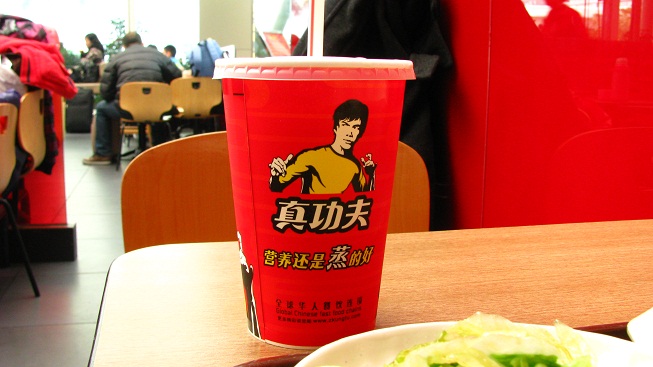
This chain can afford to buy his image, and Manfred Wong can’t afford to buy his life story?
Since it was the winter, there wasn’t much to do in Urumqi, except for doing the Lunar New Year family visits, and of course, watching movies. There aren’t many newer movie theaters in Urumqi, though the theaters have already all switched to digital projections a few years back. One of the most popular movie theaters in the city is The People’s Cinema. Located in the southern central part of town:
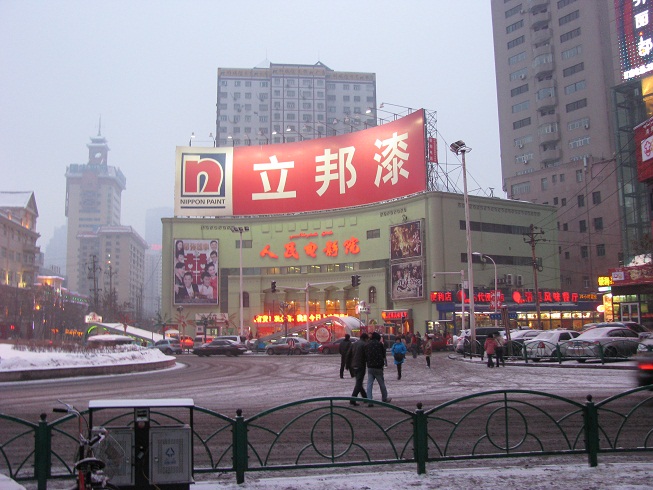
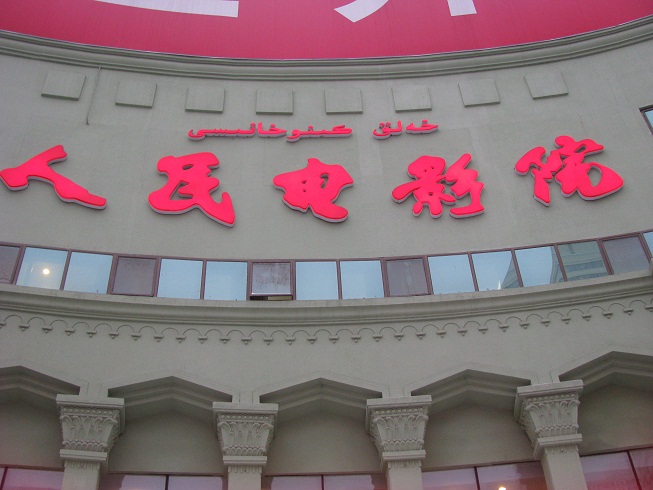
You might be wondering why there’s Arabic-like letterings above the Chinese letters. That’s because 45% of the population in Xinjiang Province are Uyghurs, and they speak their own unique language. Instead of Chinese and English, most official signs are in Chinese and Uyghur instead. The Han Chinese-Uyghur ratio leans much, much more towards Han Chinese in the capital city of Urumqi, but language policy is language policy.
Anyway, The People’s Cinema, which is literally across the street from the Peace Theater, is quite large - about five stories, and has a total of 12 screens:
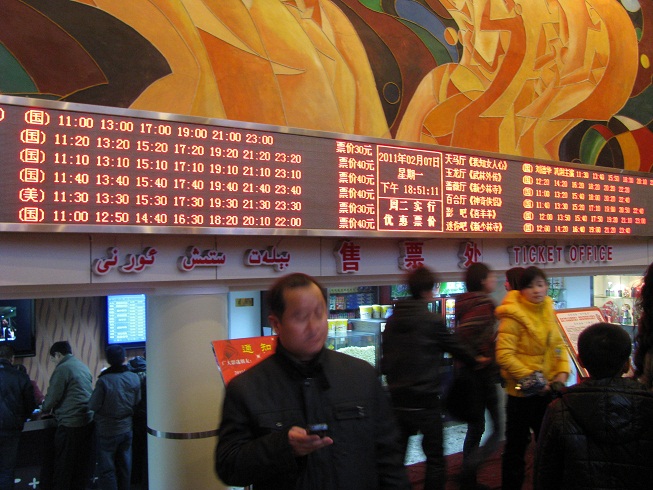
The box office. Average ticket price: RMB40
I wanted to catch Andy Lau’s WHAT WOMEN WANT, but for time reasons, I caught the Mainland Chinese comedy MY OWN SWORDSMAN instead:

Oh, look, there’s that other Andy Lau movie, too.
Even though MY OWN SWORDSMAN proved to be immensely popular, we got sent up to the small house on the top floor, which I estimated had less than 100 seats. The screen wasn’t big (perhaps no smaller than a small cineplex house in Hong Kong), and the film was shown in digital projection. However, my big problem was the audio. Despite having been renovated (or so I was told), the theater’s surround speakers were the only thing that sounded clear and normal. The center speaker (located behind the screen) was muffled and flat. Since the dialogue almost always come from the center speaker, that means it was very hard to catch the dialogue. Thankfully, since the film relied on local accents for its humor, it has simplified Chinese subtitles.
I will be reviewing the film for the site later, but I will say that I enjoyed it far more than I had expected. The Chinese language-based humor was great, and even a lot of the film’s modern humor (infomercial parody, internet slangs) translated to plenty of laughs. The audience was talky as hell, as one can expect for a commercial film screening in China, but it didn’t totally detract from the film experience.
I went to a multiplex on the other side of town a few days later for WHAT WOMEN WANT, which you can read the review for here. Unfortunately, I did not take pictures of the theater, but it’s a small, six-screen multiplex on the third floor of a hotel building that I couldn’t find any internet listing for. Worse yet, it’s also across the street from the city’s brand-new multiplex. I still can’t figure out why we didn’t go there instead, because the Tianshan multiplex not only played the film below the usual volume (which may be why the film felt like it dragged a little bit), it also played the film in the wrong aspect ratio in order to fit it on its permanently 1.85:1 aspect ratio screen.
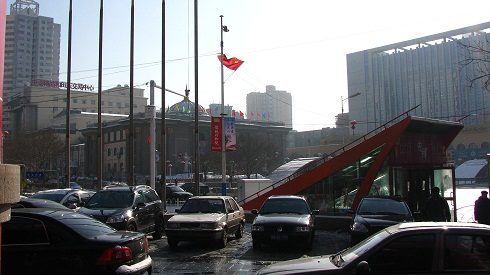
The above is from across the street of the city’s other big theater (the one with the domed roof), the People’s Theater (I know, it’s always people’s something in a communist country). Not only does it now have 3D equipment, it also houses more than 10 auditoriums. It’s Urumqi’s oldest theater, and it’s been renovated as well. When I entered, it had metal detectors at the entrances due to the city’s security situation.
The general assessment I get is that Urumqi still hasn’t quite caught up to being good enough to really attract people to get out of their houses and to the movies. I’ve heard before that Chinese multiplexes have to be up to a good standard in order to make people feel like movie tickets are worth buying, and either the people of Urumqi don’t care enough, or people just don’t know how to run a decent theater. Cushy seats and digital projections make things easier, but you need people who know how to project a film properly or make sure the speakers run normally to give people the true theater experience. Sadly, that’s not what I saw.
As for the rest of the trip, I ate a lot of lamb, and I literally could not find a place that had a decent selection of legit DVDs. Such is the biggest city in Western China.
One day, I hope to go across the river over to Shenzhen to see what the newer movie theaters are like, and more on the movie world from a moviegoer’s point of view in China.
Posted in feature, China | No Comments »
Thursday, January 6th, 2011
- Today on the front of Oriental Daily’s entertainment page is a story about two filmmakers trying to get the Hegemon-King of Western Chu story made at the same time. On one hand is CITY OF LIFE AND DEATH director Lu Chuan’s version, starring Daniel Wu, Liu Ye, and Chang Chen. The word of Apple Daily is that Lu quit/was removed from the project after he disagreed with his production company about the film. Lu then found other investors and resurrected the project, leaving his previous production company very mad.
So, Lu’s first production company then hired director Daniel Lee (of DRAGON SQUAD and THREE KINGDOMS), got a cast that’s rumored of Louis Koo, Fan Bing Bing, Huang Xiaoming, and Andy Lau. Lee said in an interview that the film hasn’t confirmed its cast yet, but will be ready to shoot in March.
I know Daniel Lee has the bigger cast and all, but my money’s still on Lu Chuan.
Story from Apple Daily, in Chinese, for access from Hong Kong only. Also take Apple Daily news with a grain of salt.
- Hollywood studio Warner Bros. is finding a new way to penetrate the Chinese market - internet video on demand. The studio signed a deal with video site Youku to let Chinese users watch the film for a few yuan. Compared to the already low price of a DVD, there’s no excuse for Chinese netizens to illegally download the movie other than….well, who knows?
- More in video-on-demand news, FUNimation in the United States has signed a video-on-demand deal with Asia Media Rights, who has been active in buying Asian films for such type of distribution model. FUNimation holds films such as EVANGELION 2.0 and SUMMER WARS.
- Korean pop has officially invaded Japanese music with popular girls group Girls’ Generation winning Best New Artist at the Japan Gold Disc Award.
- Derek Elley at Filmbiz Asia reviews the hit Chinese comedy JUST CALL ME NOBODY and COLOR ME LOVE, the latest film from BLOOD BROTHERS director Alexi Tan.
Posted in United States., China, news, music, Japan, Hong Kong | No Comments »
Tuesday, January 4th, 2011
As I keep trying to plug the hole that lets the spam come in, there will still be no comments. You can @ me on Twitter and that’ll be a comment. Will be glad to retweet or paste back here on the blog.
- My report on 2010 Chinese box office. There hasn’t been a comprehensive report with these numbers yet, so I crunched the numbers myself based on SARFT’s and entgroup.cn’s numbers. Feel free to refer to them, as they should be pretty close to the official numbers.
A little update: As of January 3rd, LET THE BULLETS FLY has surpassed INCEPTION to become the third highest-grossing film ever released in China with 530 million yuan in the bank.
- Chinese-Korean director Zhang Lu (of DESERT DREAM and IRI) will be getting a retrospective of his work at the Korean Film Archive in March. The venue will also be giving blankets and pillows for those who want to sleep through them.
- The full program hasn’t been announced yet, but the Berlinale has already announced roughly half the films in its Panorama section, and it includes three Korean movies! I can’t wait for them to announce the Generation K-Plus selections to see which Hong Kong movie 14-year-olds will be honoring this year.
- Speaking of being honored, the Korean Times gives an introduction/review to this weekend’s no. 1 Korean film THE LAST GODFATHER. It sounds like the comments section of the trailer is funnier than the movie itself. A sampling:
“As you said, this movie might be a crap movie.
Replace “Korea” and “Koreans” with “China” and “Chinese”, and you wouldn’t be able to tell the difference.
Short entry today. They’ll get longer as I get my groove back.
Posted in China, festivals, review, South Korea, Hong Kong, box office | No Comments »
Monday, January 3rd, 2011
Yes, another year, another New Year’s resolution to keep up the blog. However, I’m taking several measures to make sure my blogging work can run a little more smoothly.
First, all number crunching will be left to my Twitter. Without much time to spend writing an entry everyday, leaving the number crunching out of the entry ensures that I wouldn’t have to stop and do all those calculating. However, I can access my Twitter a lot more often than my blog, so it makes sense for me to do number reporting whenever I can get to the numbers. That hopefully means I will report even more numbers than I already do on Twitter, since right now it’s only covering Hong Kong and Chinese numbers. Do note that I will keep covering any big news regarding box office here.
Second, I have over 40,000 comments sitting there waiting for me to likely mark them as spam. I am literally getting a new spam comment every minute, and I simply cannot check in every hour to get rid of them. So until I can get rid of all of those comments to a size I can work with, I have to close the comments section. I will, however, take any comment on my twitter instead.
And now, on with the news!
- China’s box office grew by an astonishing 61% in 2010, making it now the third largest film market in the world. China expects itself to surpass Japan - 2nd in terms of gross - by 2015. With Japanese gross partly due to high ticket prices, I wouldn’t be surprised if China has already passed Japan in terms of attendance.
- The Kouhaku Uta Gassen, one of Japan’s highest-rated television shows and a cultural institution, scored OK ratings for its 2010 edition.
- Speaking of box office, Hollywood Reporter recaps this year in Bollywood, with some low-budget films scoring surprisingly high grosses.
- Derek Elley of Film Business Asia has one of the first official English-language reviews of LET THE BULLETS FLY. I agree with the assessment.
- Once dubbed the “Golden Manager”, Paco Wong officially leaves Gold Typhoon (previously Gold Label) to pursue other businesses, as well as continuing to develop movies.
Why is this important? Paco Wong resurrected the likes of Leo Ku, helped lift Miriam Yeung to become one of the biggest stars of Hong Kong, and nurtured Stephy Tang to be a star. He nurtured so many award-winning pop stars at one point that every other pop star started their thank-you speech with “thank you, Paco.” Under his reign as artist management, Gold Label became one of Hong Kong’s biggest record labels and eventually churned out successful local films like DRAGON LOADED and the Patrick Kong romance films. They weren’t necessarily good movies, but Gold Label made local films for a local audience, and that makes Paco Wong an important man already.
When Gold Label became Gold Typhoon, managerial restructuring put Paco into executive position and away from artist management. After losing Miriam Yeung and Leo Ku, it became downhill for Gold Typhoon and Paco. The last film Gold Typhoon produced under Paco was LOVE CONNECTED in 2009.
- Was going to report some box office speculation news for China, but it’ll wait until more solid numbers come in from cinema.com.cn
Starting off slow for now, but will slowly get into the groove.
Posted in gossip, India, China, review, Hong Kong, box office | No Comments »
Friday, December 17th, 2010
Thanks to the good people at Emperor Pictures, I was able to watch a “99% finished” version of director Jiang Wen’s LET THE BULLETS FLY. The film opened yesterday in China, but the HK print wasn’t, probably because it was to get the subtitles done and get it screened for local censorship authorities (It got a IIB rating, by the way). The film was essentially in mono, and some effects weren’t done yet (maybe some rough edits need as well). Nevertheless, it was pretty presentable anyway.
A manly Mainland Chinese movie could not ask for a better leading cast than what actor-director Jiang Wen has for LET THE BULLETS FLY, and the three men could not ask for a better script, either. Written by six credited writers (and probably a few more uncredited ones), LET THE BULLETS FLY is a sensational, hilarious crowdpleaser made even better if you speak Mandarin.
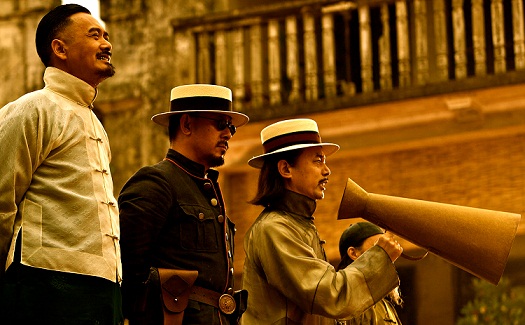
Photo courtesy of Emperor Motion Pictures
Based on a novel, it seems like Jiang’s starting point was from the popularity of the Korean Kimchi Western THE GOOD, THE BAD, THE WEIRD, but Jiang managed to make his film, about a battle of wits between a righteous bandit (Jiang Wen himself), a town ruler (Chow Yun Fat, hamming it up), and a corrupted in between (Ge You) something entirely different. Packed with speedy dialogue exchanges, a whole lot of gunfire, and tons of dark humor (even the brutal violence is played for nervous giggles), the film speeds through its 132 minutes without a single wasted moment. The game is long and twisty, but it’s consistently inventive. The film may be sold as an action film, but it’s actually one of the funniest movies of the year.
LET THE BULLETS FLY may also be Jiang’s most commercial film, playing the comedy at multiple levels. Even though the subtitles, which have no grammatical problems whatsoever, can’t effectively carry the Mandarin wordplay, Jiang also fills the film with plenty of surreal visuals. It’s refreshing to see a commercial film that plays so well to the masses without having to dumb itself down. The script is consistently smart, packed with sly political/social satire and witty bantering that sadly will not carry to a non-Mandarin-speaking audience (The HK audience I saw it with had problems catching up at points).
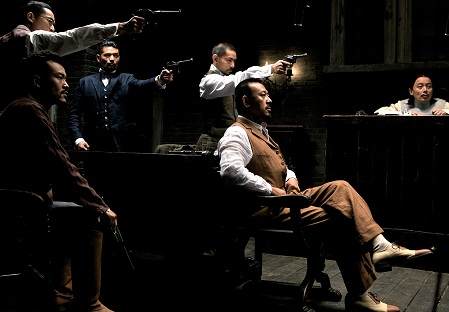
Photo courtesy of Emperor Motion Pictures
If there’s one notable weakness with the film, it’s the lack of an emotional core. The friendship that grows between Jiang Wen’s “Good” character and Ge You’s “Ugly” character is the most developed relationship in the film, but it’s still played for laughs through most of the film. Jiang Wen treating the entire movie as one big dark comedy will probably not sit well with some, but it’s also so well done in other aspects that it probably won’t matter once you’re along with the ride.
Some who read my reviews may think that I’ve turned into a big grinch who doesn’t like anything I watch (at least anything from China). Here’s a perfectly fine commercial film that I DO like. The best Mainland Chinese film I’ve seen all year may still be APART TOGETHER (though it was never released in China), but I can say LET THE BULLETS FLY is the best Mainland Chinese commercial film I’ve seen all year, if not one of the best Chinese-language films of the year.
I still don’t like AFTERSHOCK, though.

Photo courtesy of Emperor Motion Pictures
Again, my thanks to the people at Emperor Motion Pictures. I am still highly appreciative, regardless of the film’s quality.
Posted in China, review | No Comments »
Sunday, July 25th, 2010
The title says it all: This coverage covers the three films I watched in the last two weeks, all sucking (for the lack of a more eloquent word) in varied degrees:
Kung Fu Hip Hop 2 (2010, China, Dir: Lau Bao Xian)
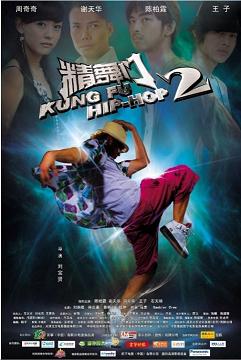
It’s like the Hawaiian version of ONG BAK
Get those fingers resurrected. The terrible KUNG FU HIP HOP was elevated into “so bad it’s good” territory with its infamously bad English subtitles. Sadly, the screening the official LoveHKFilm movie group (which sometimes go by other names like “The Gang of Film” or “People Who Watch Movies so You Don’t Have To”) attended included no English subtitles. Fortunately for the Chinese-impaired, the story’s plot is so simple that they didn’t need to know the dialogue to understand most of the plot.
Sadly, for the rest of us, we had to sit through the dialogue.
A sequel in name, KUNG FU HIP HOP 2 comes with a brand-new cast led by Wilson Chen, Zhou Qiqi (who shows off quite a bit of, ahem…talent in the film), Prince (of Taiwanese boy group Lollipop) and Michael “Laughing Gor” Tse (former backup dancer and the winner of a television celebrity dancing contest). For fans of any of these actors, the film is practically review-proof. This is especially the case for Prince (no relation to the artist who formerly goes by that name), who seems to believe that the harder he squints his eyes, the better his acting is. The Prince fans that made up most of the film’s audience thought that it was charming to the max, which would make me the old geezer.
In addition to the film’s weak acting, directing, and editing, director Lau also makes the misguided decision to hire real dancers to go up against Chen, Prince, and his dance crew. As the actors stay in the back while the other dancers do the real dancing, the opponents - in more case than one - end up performing even better than the main stars and still manage to lose the competition. They must’ve gotten the judges from FIFA.
Nevertheless, the dancing is just about the only redeemable thing left in this film, as even the unintentionally hilarious humor of the first film is gone. I probably should go easier on it, since it’s just disposable, teen-oriented time filler. Then again, any teen should have better things to fill their time than this.
Actually, I take back about the film having only one redeemable thing - the film features Wilson Chen doing parkour. Price of admission: earned.
Triple Tap (Hong Kong, 2010, Dir: Derek Yee)
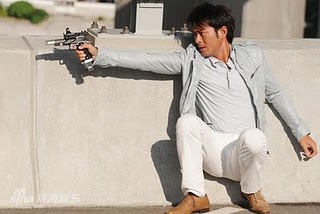
“That Golden Rock guy is just coming around the corner…”
As I mentioned on my Twitter, Derek Yee said that this isn’t really his film, but a film for the commercial audiences of China. Audience elsewhere might be wondering why a film so cerebral and so talky would ever be commercial, but the film has now topped Chinese box office for two weeks in a row, showing that Yee and his two co-writers ended up being quite successful.
A continuation of DOUBLE TAP (which Yee produced), TRIPLE TAP deals with similar themes about human nature and the power of the gun, except it does so in a far more talky, didactic manner than the first film. DOUBLE TAP was a tense, violent action film that went a little far in portraying its psychologically abnormal villain (played by an over-the-top Leslie Cheung). TRIPLE TAP is a film that pretends to be clever by hiding information from its audiences, and ends up frustrating that very same audience by not going anywhere for a very long time.
Its characters are shallow, unconvincing, and worst of all, bland. Louis Koo the financial genius is boring, even when he hits the point of insanity; Daniel Wu has little charisma as the righteous cop; the return of the Alex Fong character from DOUBLE TAP and ONE NITE IN MONGKOK was good, but even he’s forced to indulge in Yee’s silly depiction of crime solving reminiscent of Simon Yam the Jedi Cop in BLACK RANSOM. Running a full two hours, Yee stretches the story to the point of boredom without much to get its audience to its inevitable ending. For a film by any other filmmaker, this is a failure of a film. For a Derek Yee, it’s a betrayal against audiences outside China. There may not be a billion of us, but we pay to see your movie, too.
Flirting Scholar 2 (China/Hong Kong, 2010, Dir. Lee Lik-Chi)
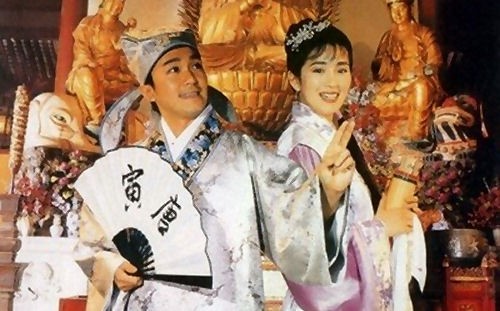
Director Lee Lik-Chi wants you to remember this movie…
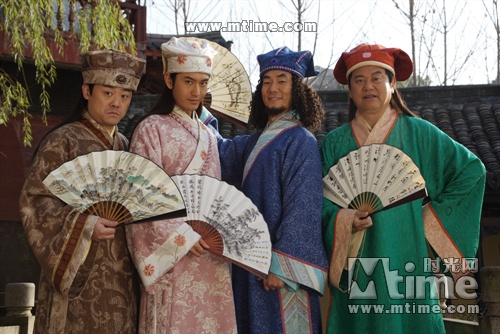
The problem is he wants you to do it while watching this.
The worse Chinese (intentional) comedy since HERE COMES FORTUNE is an embarrassing affair for everyone involved, and the fault all go to director Lee Lik-Chi and its producer Charles Heung. The prequel, which follows the adventures of Tang Bofu (played in the original by Stephen Chow, who we now know should take credit for the first film’s success) before he became one of the four famous scholars, rides on the fact that the first film was funny by recycling jokes that no longer work, especially when the actors from the first film are now 15 years older. All of it is exhausting to watch, and like a clown hopping all over the place to get you to laugh to no avail, it’s exhausting to watch.
It’s hard to point the finger at the actors, though, since many of the actors from the first film and various cameos are just people looking for a payday and did what they were told to do. Star Huang Xiaoming tries his best to do comedy, but he’s obviously in no position to be in a HK-style mo lei tau comedy. Zhang Jingchu, who has been sharing promotional efforts between AFTERSHOCK and this film, is so good here that the only way she could’ve pulled off this performance is if she pretended that she was in a much better movie.
There have been reports that Lee Lik-Chi was kicked out of the editing room because he wanted to make the film more of a romantic tragedy than a mo lei tau comedy. Sorry, buddy, the best decision you or anyone would’ve made is to have not made this movie at all.
Posted in China, review, Hong Kong | 2 Comments »
|
|
|
| |
| |
|
|
|
|
|
|
|
|
|
|
|
|
|
|
|
|
|
|
|
|
|
|
|
|
|
|
|
|
|
|
|
|
|
|
|
|
|
|
|
|
|
|
|
|
|
|
|
|
|
|
|
| LoveHKFilm.com
Copyright © 2002-2026 Ross Chen |
|
|










